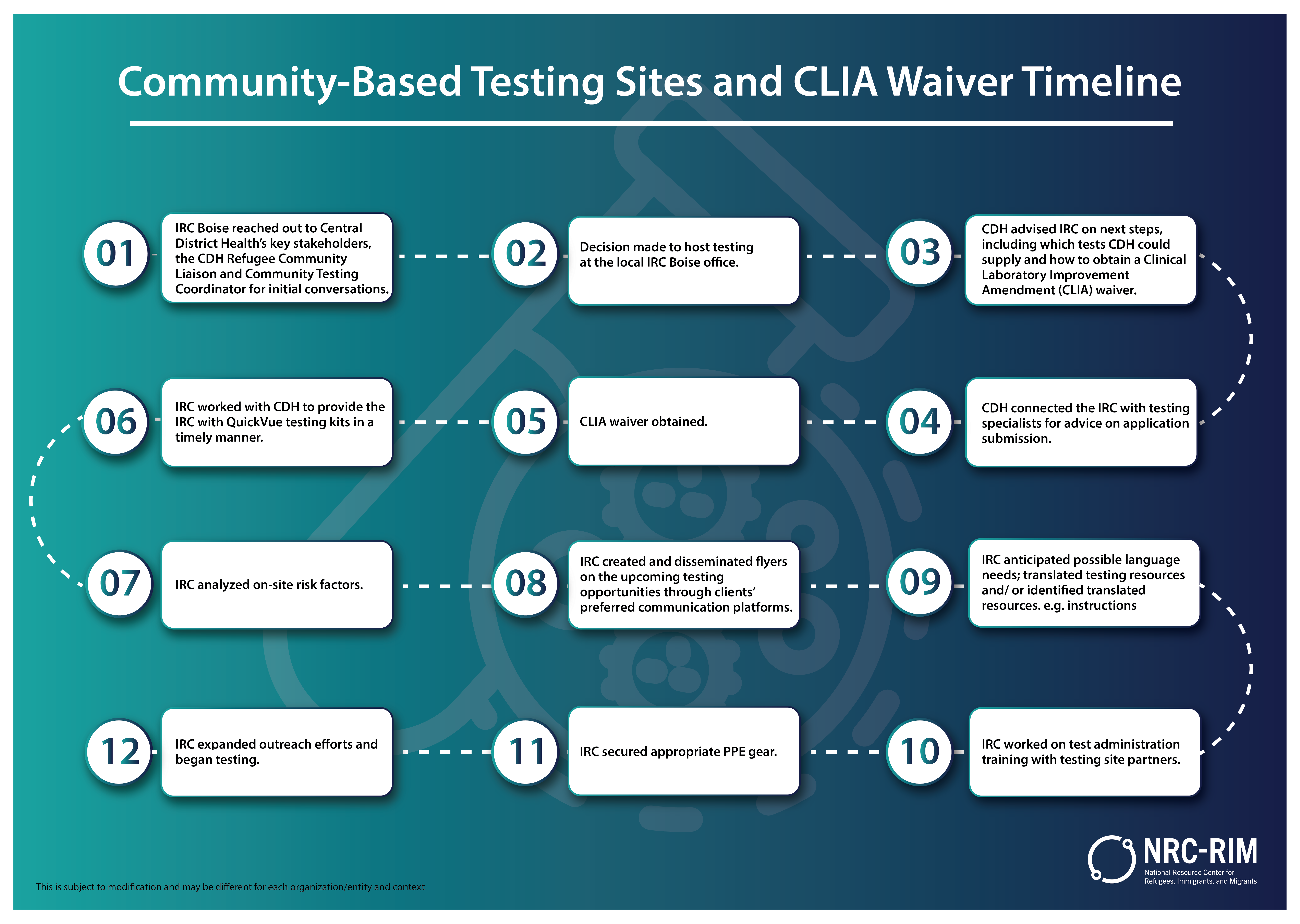Refugee, immigrant, and migrant (RIM) community members have experienced significant obstacles to accessing consistent and free COVID-testing. Community members face a lack of walk-up and/or trusted testing sites, limited (and fluctuating) cost-free testing supplies and a lack of culturally and linguistically appropriate testing resources on-site. Testing is a critical tool in the mitigation of COVID-19, particularly during surges. Having free testing sites that are readily accessible to RIM communities and that feature bilingual/bicultural information and staff allows the community to feel at ease and addresses barriers faced by those disproportionately impacted by COVID.
During the Winter 2022 Omicron surge, numerous International Rescue Committee (IRC) clients in Boise needed to get tested for COVID-19 to prove negative status to employers and schools. However, there were few free testing sites and navigating scheduling appointments was often confusing for those who did not speak English. Consequently, adults missed worked resulting in lost wages and children missed school resulting in lost learning.
The Testing Journey: Timeline and the CLIA Waiver
Based on IRC clients’ expressed need for testing in December 2021, IRC in Boise collaborated with the local public health department, Central District Health (CDH). IRC Boise reached out to
Central District Health’s key stakeholders, the CDH Refugee Community Liaison and Community Testing Coordinator. Conversations focused on having a local testing site for RIM communities, what this process would entail (who would administer, how would it work), where it should be located, and how to gain access to tests. IRC Boise eventually decided to host testing at their local office because the IRC location is familiar, accessible and trusted among RIM communities; allowing clients to quickly navigate, get back to work and get children back in school.
CDH advised IRC on next steps, including which tests CDH could supply and how to obtain a Clinical Laboratory Improvement Amendment (CLIA) waiver. The waiver allows agencies to legally administer testing. Any facility performing tests that provide a health diagnosis or assessment must have a CLIA certificate) For more information on applying for the CLIA waiver, please visit this website. As the CLIA form and processes can be complex, especially for organizations applying for the first time, CDH connected the IRC with testing specialists for advice on application submission. Things to keep in mind with the CLIA waiver:
Once the CLIA was obtained, IRC had to appropriately prepare for testing by doing the following:
- Work with CDH to provide the IRC with QuickVue testing kits in a timely manner.
- Analyze on-site risk factors: ensuring a safe, social distance environment for client and staff safety, securing personal protective equipment (PPE) gear, and how to use the testing kits.
- Create and disseminate flyers on the upcoming testing opportunity through clients’ preferred communication platforms like TextIt. For more information on TextIt, please check out this resource.
- Anticipate possible language needs; the office explored translating QuickVue guides while also utilizing the curated translated videos on the NRC-RIM website (this can be found here).
- While test administration training is not required by the CLIA waiver, it is a separate measure to take into consideration and work on with respective testing site partners.
- Once the IRC Boise team began securing appropriate PPE gear (masks, gloves, face shields and protective clothing), they expanded outreach efforts to begin testing between March and April 2022.
Lessons Learned: Challenges, Successes, and Recommendations
There are points to consider before planning a testing site, one of which is to see if this is a need in the community. If community input shows that a testing site would be useful, further consider these important points before planning your testing site:
- Make sure you have strong, meaningful two-way partnerships with your local health district. They often have the guidance and resources you will need to host a site especially if your site does not typically administer tests.
- Plan in advance; anticipate possible surges. IRC Boise had difficulty securing tests during Omicron surges between late 2021 and early 2022. Although it may be difficult to predict changes, plan for a few months in advance especially prior to flu and/or winter seasons. IRC Boise now has the infrastructure in place if there is an upcoming surge and decrease in federal funding to have readily available testing.
- Make sure to assess all risk factors ahead of time to ensure the safety of both staff and clients. Consider consulting a testing specialist at your organization or look for trainings that could be given to the team administering the tests.
- Host at sites that are easily accessible and trusted by community members.
- Come prepared with the information you need for the CLIA waiver.
- Secure translated materials, such as translated videos on how to use the testing kits.
